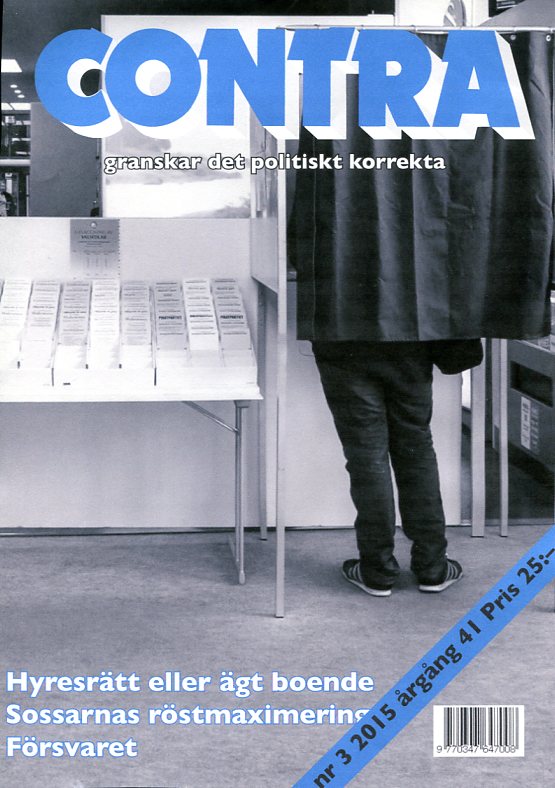
Not enough defence
Until 1989 Sweden had a strong defence. Conscription made it possible to mobilize 800,000 and the air force was once the fourth strongest in the world (after the US, the USSR and Britain). But after the end of the Cold war Swedish politicians decided to disarm. Today parts of the Swedish defence may be efficient, but from an overall point of view it is insufficient. Especially in a situation with an increasingly aggressive Russia threatening Sweden’s neighbours on the other side of the Baltic Sea.
Social Democrats gain votes through immigration, by C G Holm
Economic progress, an ever more educated middle class and fewer traditional blue-collar workers should be devastating for the Social Democratic party. Yes they lose votes, but not as many as you should expect. Their salvation is immigration. Contra analyzes voting patterns in areas with a similar socioeconomic standards, but different origins of the population. The conclusion is clear, more immigrants give more votes for the Social Democratic Party and vice versa.
Not my circus, not my monkeys,
by Kjell Albin Abrahamson
Kjell Albin Abrahamson is fed up with accusations of links with East German Stasi. When he was a foreign correspondent for Eastern Europe in service of the Swedish Broadcasting Corporation he had to be in touch with the East Germans and he thus was registered with Stasi. The East Germans did it and he doesn’t know why. What can he tell about it? Nothing. He quotes a Polish proverb, it’s not my circus, it’s not my monkeys.
Blasphemy legislation, a way to persecute Christians in moslem countries,
by C G Holm
Blasphemy was banned in Sweden from 1563 to 1970. In the penal code of 1734 it was stated that a person who speaks or writes against the holy words should lose his life. The punishment was reduced to fines in the beginning of the 20th century.
In moslem countries blasphemy is used to persecute Christians. Asia Bibi (picture on page 8) is sentenced to death in Pakistan after a row with her moslem neighbours. Pregnant Shama Bibi and Shahzad Masi , also from Pakistan, were killed by the mob and thrown into a brick furnace because it was rumoured that they had burnt pages of the Quran. Just two examples of persecuted Christians accused of blasphemy.
Bill and Hillary Clinton, campaigning and earning a lot of money, by Carl Johan Ljungberg
The Swedish billionaires Lundin (oil and mining) contributed 100 million US dollars to the Clinton Foundation. Hillary stopped supporting legislation that she previously had supported as a senator, legislation that would have negatively affected the Lundin brothers’ mining interests in the Congo.
Even if Hillary Clinton has been the favourite in the Democratic Party, she is now scrutinized by the media, and her business interests have been noted. Peter Schweizer’s book Clinton cash, The untold story of how and why foreign governments and businesses helped make Bill and Hillary Clinton rich, tells a lot.
Renting with low debt or owning with high debt?, by Fredrik Runebert
Sweden didn’t suffer problems in housing finance during the financial crisis, as did the United States in 2007-2009 and Denmark in 2006-2009. But Sweden has problems now in the sense that negative interest rates with the Bank of Sweden combined with a quantitative ease increase housing prices rapidly and with them mortgages, which now are close to one per cent interest. What will happen when interest gets back to a normal level? Is there a bubble? And is ownership of housing combined with high mortgages a threat to financial balance in society as opposed to a system with people renting their housing? These questions are discussed and Swedish practice is compared with practice in the neighbouring Scandinavian countries.
The big battle, by Filip Björner
The war in Northern Syria and Northern Iraq is not only a war initiated by fanatics advocating the Caliphate – the Islamic State. For many warriors it is also the defining battle between shia and sunni moslems. There are other groups participating, like Kurdish peshmergas, but basically it is a war between shias and sunnis and both sides are convinced that they are participating in the decisive battle foreseen by the prophet Muhammad.
True ethics is based on altruism,
by Joakim Förars
In Contra # 2 2015 Filip Björner interviews Yaron Brook at the Ayn Rand Institute, who asks why we are losing the battle for people’s minds in spite of the superiority of capitalism. His answer is that it is wrong to argue from an economic point of view, which is bound to lose against moral arguments. Förars agrees this far, but means that it is wrong to raise selfishness to a moral value. Such an approach is a way to make sure that you lose the battle.

